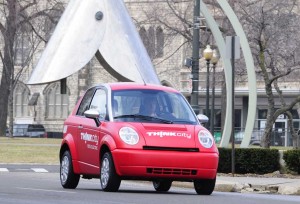The small battery car maker, THINK, is heading back to the U.S., and this time, it plans to produce its electric vehicles at an all-new plant going up in Elkhart, Indiana.
THINK, which emerged from bankruptcy protection last year, plans to invest $43 million in the Midwest facility, and hopes to start production of its urban commuter car, the THINK City, during the first quarter of 2011. When the facility reaches full capacity, in 2013, the maker hopes to be turning out as many as 20,000 battery-electric vehicles, or BEVs, annually.
The schedule is “pretty aggressive,” acknowledged THINK CEO Richard Canny, during an interview with TheDetroitBureau.com, “but the modular construction of the vehicle lets us get production up and running pretty quickly. We’ll hit 70% local content by 2013,” he added, suggesting, “it will be local content equal to or higher than many of the Big Three models.”
Founded in Norway, THINK has ridden the proverbial roller-coaster during its two-decade existence. It was purchased by Ford Motor Company, a decade ago, then sold off as part of the U.S. maker’s back-to-basics strategy. That led it to abandon the U.S. market, in 2002. Financial woes forced it into Chapter 11, but with rising industry interest in battery power, new investors came to the rescue last year. That includes Ener1, Inc., which now owns a 31% stake in the BEV maker.
Ener1’s Indianapolis-based subsidiary, EnerDel, will now provide the new lithium-ion, or LIon, batteries for the THINK City. That will allow the maker to boost range for the U.S. model to 100 miles, and increase the BEV’s top speed to at least 70 mph. An imported version of the City will go on sale this year, before the Indiana plant gets up-and-running.
Initially, Canny said the U.S. version of the THINK City will go for around $30,000, after factoring in a $7,500 federal tax credit. But he told TheDetroitBureau that his battery costs are expected to drop by at least 7% annually, while other efficiencies will help reduce the cost of the City by 3 to 4%. The goal, by mid-decade, would be to bring the price of the THINK City down, he said, to “the low-$20,000 range.”
At the same time, THINK anticipates its LIon batteries will become lighter, more efficient and faster to charge. The company believes that it will hit the “sweet spot” by offering the capability to give the City an 80% recharge in 15 minutes using special high-speed chargers. But, like other makers, THINK is looking at other options that could include offering customers longer-range batteries or a higher-performance version of the battery powertrain.
The decision to go to Elkhart was driven by a number of factors, according to Canny, including what he cautiously described as a “competitive” incentive package. But he stressed that, “you don’t choose a location just based on incentives.” The new factory, he noted, has access to a pool of trained labor, is near the traditional automotive supplier base, and is close to a number of other new battery-electric vehicle companies.
THINK’s CEO said it is “possible” the company will eventually use the Elkhart plant as an export base. Canada would likely be one of the first markets, if that happens.
While “electrification” has become a hot topic in the auto industry, there’s plenty of debate over how well such vehicles will sell, especially in the United States. Canny said he is “cautiously optimistic,” but expects there will be “geographically isolated markets” within the U.S., rather than a broad national market for battery cars.
The strongest demand, he said, will come in cities where commutes are relatively short and where there’s strong political support that could lead to incentives for BEV buyers, such as tax credits or access to commuter lanes.
Whether taxpayers, increasingly concerned about the huge deficit and government subsidies put up with this remains to be seen.


Good new look on your email alerts.